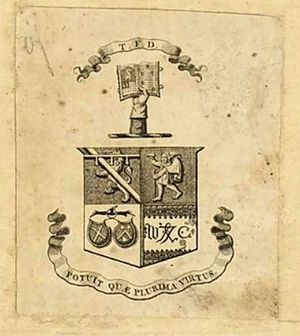Thomas Frognall Dibdin 1776-1847
Thomas Frognall DIBDIN 1776-1847
Biographical Note
Born in Calcutta, the elder son of Thomas Dibdin, a naval captain and merchant venturer; both his parents died when he was four and he was brought up by his maternal uncle, William Compton, and educated in Reading, Stockwell and Brentford. He matriculated at St. John’s College, Oxford, in 1797 (BA 1801), and was awarded his MA, along with BD and DD degrees in 1825. He initially pursued a career in law, firstly in London, but instead of being called to the Bar, he moved to Worcester. Abandoning law, he turned to the Church, being ordained deacon in 1804, and very shortly priest. He was offered a curacy in Kensington, and subsequently various preacherships in London. He was appointed a Royal Chaplain in 1831. These various appointments allowed him to pursue a career as an author, publisher, bibliographer, cataloguer, traveller, and book amanuensis to various wealthy clients.
Of his 46 works, Dibdin is probably most remembered for his Bibliomania (1809). Even if he didn’t invent the term, he was undeniably its archpriest. He was, though, in his Library companion (1824) the first to use the term ‘bibliophile’. Dibdin was a sociable and convivial man. He was a founder, along with his fellow bibliophile Richard Heber, of the Athenaeum Club in London. He was also the originator of the Roxburghe Club, the oldest society of bibliophiles in the world, founded to celebrate the great Roxburghe sale of 1812, at which the Valdarfer Boccaccio (1471) achieved £2,300, then the highest price ever achieved for a book at auction (it remained a record until the sale of a copy of the Gutenberg Bible at the Henry Perkins sale in 1873 which sold for £3,400).
Books
Dibdin claimed to have first caught “the electric spark of bibliomania” in his early youth, but throughout the rest of his life his limited financial resources always conspired against his being able to acquire the works he most admired. These were the incunabula, "black letter" books and editiones principes of classical authors which he helped other collectors, such as Earl Spencer, Sir Mark Masterman Sykes, or Richard Heber to acquire, and about which he wrote so much.
What he did assemble, as A.N.L Munby describes, was “a bibliographical reference library of great distinction. Hardly any major work appears to be lacking and the proportion of copies on large paper or in some other way remarkable is very high.” His impressive collection of sale catalogues, including that of Lazarus Seaman (1676, the first English book auction), enabled him to inform his readers as to who had brought what and for how much. A fuller account of his reference collection, along with other books he owned, and particularly those acquired on his tours of France and Germany, is supplied by Ronald Hall.
Dibdin’s inability to manage his financial affairs forced him to sell his collection in 1817. Munby reproduces the sale catalogue, along with the names of buyers and prices. The catalogue describes the books as “all in fine condition, and principally bound by Lewis, and other eminent binders.” Such books which Dibdin retained were subsequently sold off piecemeal to alleviate the financial pressures that continued to beset him until his death in 1847; he even parted with his own set of the Roxburghe Club publications in 1837 to the bookseller John Thomas Payne.
Characteristic Markings
Dibdin used a mock-armorial bookplate which includes Caxton’s device amongst its quarterings (Franks 8595).
Sources
- Dibdin, T.F., Reminiscences of a literary life, 2 vols., London, 1836.
- Gambier Howe, E. R. J. Franks bequest: catalogue of British and American book plates bequeathed to the ... British Museum. London, 3 vols., 1903-4.
- Hall, Ronald, ‘T.F. Dibdin – Book Collector’, Manchester Review, 9, Autumn-Winter, 1961, 193–210.
- Munby, A.N.L., ‘Dibdin’s reference library,’ in R.W. Hunt, I.G. Philip & R.J. Roberts, eds., Studies in the Book Trade in Honour of Graham Pollard, Oxford, 1975, 279-314.
- O’Dwyer, E.J., Thomas Frognall Dibdin: bibliographer & bibliomaniac extraordinary 1776-1847, Pinner, 1967.
- Richardson, John V. "Dibdin, Thomas Frognall (1776–1847), bibliographer." Oxford Dictionary of National Biography.
- Sibbald, John A., ‘Book bitch to the rich – the strife and times of the Revd. Dr. Thomas Frognall Dibdin (1776-1847)’, in Shanti Graheli, ed., Buying and selling: the business of books in early modern Europe, Leiden, 2019, 489-521.
